The global AI in K-12 education market is expected to grow from USD 539.7 million in 2025 to approximately USD 13,617 million by 2035, recording an absolute increase of USD 13,077.3 million over the forecast period. This translates into a total growth of 2,423.4%, with the market forecast to expand at a CAGR of 38.1% between 2025 and 2035. The overall market size is expected to grow by nearly 25.23X during the same period, supported by increasing digital transformation in education, growing demand for personalized learning solutions, and expanding adoption of AI technologies in educational institutions worldwide.
Between 2025 and 2030, the AI in K-12 Education market is projected to expand from USD 539.7 million to USD 2,867.3 million, resulting in a value increase of USD 2,327.6 million, which represents 17.8% of the total forecast growth for the decade. This phase of growth will be shaped by increasing school digitization initiatives, expanding EdTech adoption, and growing recognition of AI benefits for personalized learning and administrative efficiency across educational institutions.
From 2030 to 2035, the market is forecast to grow from USD 2,867.3 million to USD 13,617.0 million, adding another USD 10,749.7 million, which constitutes 82.2% of the overall ten-year expansion. This period is expected to be characterized by mainstream adoption of AI educational tools, integration of advanced learning analytics, and development of comprehensive AI-powered educational ecosystems that support personalized instruction, automated assessment, and intelligent content delivery.
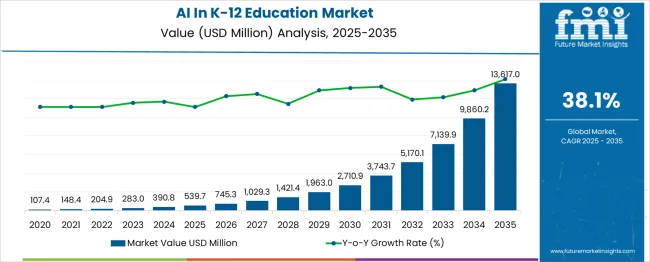
| Metric | Value |
| Estimated Value in (2025E) | USD 539.7 million |
| Forecast Value in (2035F) | USD 13,617 million |
| Forecast CAGR (2025 to 2035) | 38.1% |
Market expansion is being supported by increasing demand for personalized learning experiences that adapt to individual student needs, learning styles, and academic progress through intelligent algorithms and adaptive content delivery systems. Growing recognition of AI potential to enhance educational outcomes while reducing teacher workload is driving adoption of automated grading, intelligent tutoring systems, and smart content creation tools across K-12 educational institutions.
The expanding focus on STEM education and digital literacy is creating opportunities for AI-powered educational tools that teach programming, data science, and technology skills while providing interactive learning experiences that engage students and support diverse learning preferences. COVID-19 pandemic acceleration of remote and hybrid learning models has highlighted the importance of digital educational tools and AI-powered platforms that maintain educational quality and student engagement across diverse learning environments.
The market is segmented by component, deployment, technology, application, and region. By component, the market is divided into solution and services. Based on deployment, the market is categorized into cloud and on-premises. In terms of technology, the market is segmented into machine learning and natural language processing (NLP). By application, the market is divided into learning platform & virtual facilitators, intelligent tutoring system (ITS), smart content, fraud and risk management, and others. Regionally, the market is divided into North America, Europe, Asia Pacific, Latin America, and Middle East & Africa.
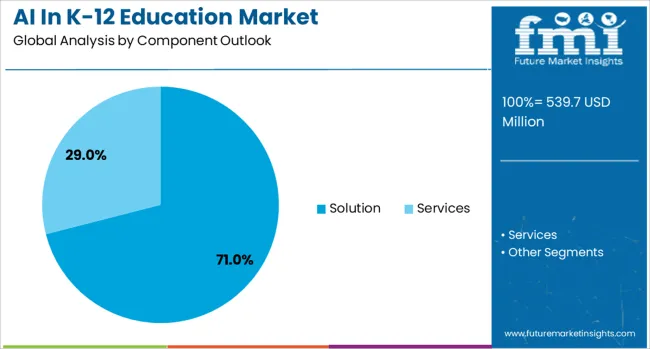
Solutions are projected to hold for 71% of the AI in K-12 Education market in 2025. This leading share is supported by growing demand for comprehensive AI-powered educational software platforms that provide complete learning management, content delivery, and assessment capabilities for educational institutions. Solution components include learning platforms, tutoring systems, content creation tools, and administrative automation that directly address educational needs and learning objectives. The segment benefits from increasing school technology budgets and growing recognition of AI educational benefits.
Cloud deployment is expected to represent 60% of AI educational platform deployment in 2025. This dominant share reflects the advantages of cloud-based educational solutions including scalability, cost-effectiveness, and accessibility that enable schools to implement AI technologies without significant infrastructure investments. Cloud deployment provides automatic updates, data backup, and multi-device access that support diverse learning environments including remote, hybrid, and traditional classroom settings.
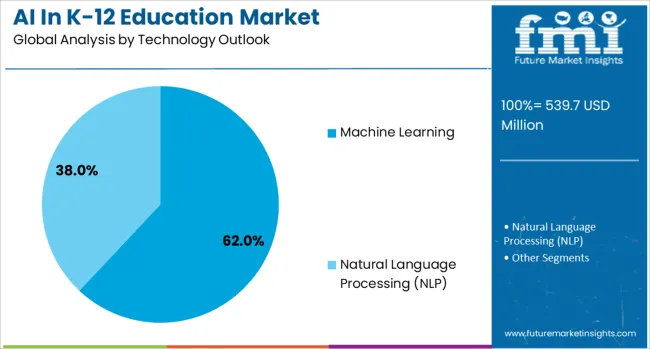
Machine learning technologies are projected to contribute 62% of the market in 2025, representing the fundamental AI capability that enables personalized learning, adaptive content delivery, and intelligent assessment systems. Machine learning algorithms analyze student performance data, learning patterns, and engagement metrics to optimize educational content and instructional approaches for individual students and classroom groups.
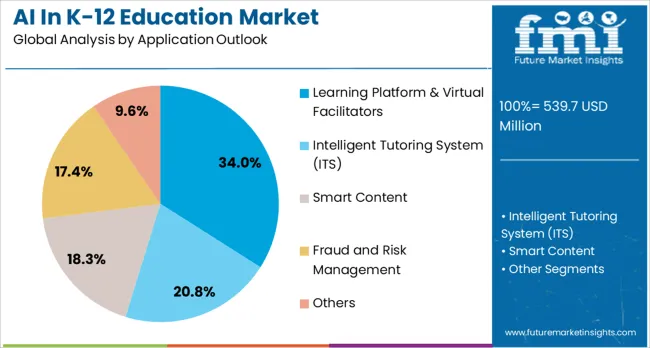
Learning platform & virtual facilitators are expected to represent 34% of AI educational applications in 2025. This segment encompasses comprehensive educational platforms that provide virtual teaching assistance, automated lesson planning, and intelligent content delivery that supports both teachers and students in achieving educational objectives while maintaining engagement and learning effectiveness.
The AI in K-12 education market is advancing rapidly due to increasing demand for personalized learning and growing recognition of AI potential to improve educational outcomes and administrative efficiency. The market faces challenges including data privacy concerns, implementation costs, and need for teacher training and technical support that may limit adoption among resource-constrained educational institutions. Innovation in educational AI technologies and comprehensive support programs continue to influence market development patterns.
The growing focus on individualized education is driving development of sophisticated AI systems that continuously adapt to student learning styles, academic progress, and engagement levels to provide personalized content, pacing, and instructional approaches. Advanced adaptive learning platforms use machine learning algorithms to optimize learning paths, identify knowledge gaps, and recommend targeted interventions that improve student outcomes while supporting diverse learning needs.
Modern educational AI systems are incorporating advanced natural language processing capabilities that enable intelligent tutoring through conversational interfaces, automated essay scoring, and real-time language learning support. NLP technologies facilitate interactive learning experiences, provide instant feedback, and support multilingual education while enabling teachers to focus on higher-value instructional activities rather than routine assessment and administrative tasks.
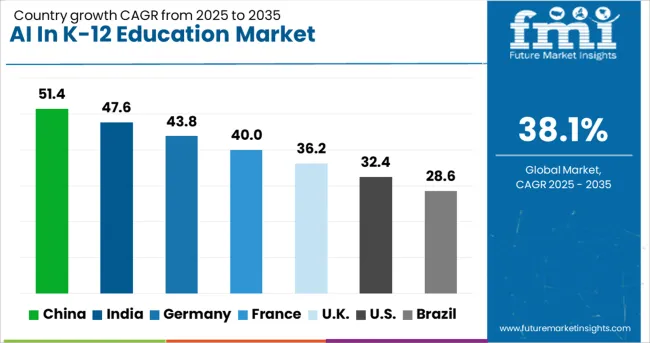
| Country | CAGR (2025-2035) |
| China | 51.4% |
| India | 47.6% |
| Germany | 43.8% |
| France | 40% |
| United Kingdom | 36.2% |
| United States | 32.4% |
| Brazil | 28.6% |
The AI in K-12 education market is growing rapidly across global markets, with China leading at a 51.4% CAGR through 2035, driven by massive government investment in educational technology and comprehensive digital education initiatives that create substantial demand for AI-powered learning platforms, followed by India at 47.6% supported by digital education expansion and government programs promoting technology adoption in schools, while Germany records 43.8% emphasizing advanced educational technology and quality standards, France grows at 40.0% with educational innovation initiatives and digital skills development, the United Kingdom shows 36.2% growth focusing on educational technology integration and assessment innovation, the United States expands at 32.4% with EdTech market leadership and comprehensive educational funding, and Brazil maintains 28.6% growth supported by educational access expansion and digital learning adoption that creates diverse opportunities for AI educational solutions across learning platforms, tutoring systems, and smart content delivery applications worldwide. The report covers an in-depth analysis of 40+ countries; top-performing countries are highlighted below.
Revenue from AI in K-12 education in China is projected to exhibit the highest growth rate with a CAGR of 51.4% through 2035, driven by massive government investment in educational technology, comprehensive digital education initiatives, and growing adoption of AI-powered learning platforms across public and private educational institutions. The large student population and focus on educational innovation are creating substantial demand for AI educational solutions. Major technology companies are establishing comprehensive educational AI capabilities.
Revenue from AI in K-12 education in India is expanding at a CAGR of 47.6%, supported by growing digital education initiatives, increasing internet connectivity, and government programs promoting technology adoption in schools that drive demand for AI-powered educational solutions. The large student population and diverse educational needs are creating opportunities for localized AI educational tools. Educational technology companies are investing in India-specific solutions and partnerships.
Demand for AI in K-12 education in Germany is projected to grow at a CAGR of 43.8%, supported by strong educational system, advanced technology infrastructure, and growing focus on digital literacy and STEM education that drives adoption of AI-powered learning tools. German educational institutions are implementing comprehensive AI solutions that emphasize quality, data privacy, and pedagogical effectiveness. The market is characterized by focus on educational research and evidence-based implementation.
Demand for AI in K-12 education in France is expanding at a CAGR of 40 %, driven by educational innovation initiatives, government support for EdTech adoption, and growing focus on digital skills development that utilizes AI technologies for enhanced learning experiences. French educational institutions are implementing AI solutions that support both traditional pedagogical approaches and modern digital learning methodologies. The market benefits from strong educational research and technology development capabilities.
Demand for AI in K-12 education in the UK is growing at a CAGR of 36.2%, supported by comprehensive educational technology strategies, growing focus on personalized learning, and increasing adoption of AI-powered assessment and tutoring systems that enhance educational quality and student outcomes. British educational institutions are prioritizing AI solutions that demonstrate clear educational benefits while ensuring ethical implementation and data protection. The market is characterized by focus on educational research and evidence-based adoption.
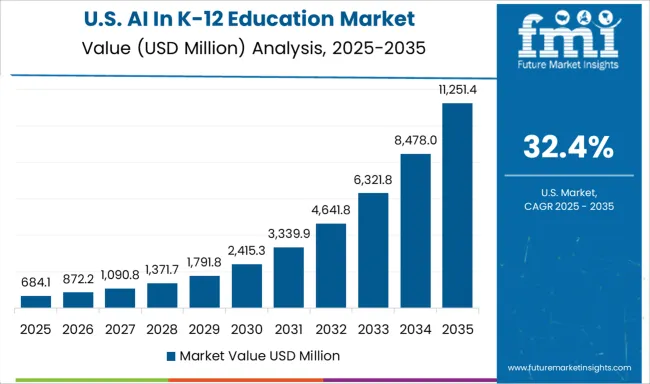
Demand for AI in K-12 education in the USA is expanding at a CAGR of 32.4%, driven by established EdTech market leadership, comprehensive educational technology funding, and growing adoption of AI-powered learning platforms across public and private educational institutions. Large educational publishers and technology companies are implementing advanced AI educational solutions that serve diverse educational needs. The market benefits from substantial educational technology investment and established implementation infrastructure.
Revenue from AI in K-12 education in Brazil is growing at a CAGR of 28.6%, driven by expanding educational access initiatives, growing internet connectivity, and increasing adoption of digital learning tools that utilize AI technologies to improve educational quality and reach. The country's large student population and educational modernization efforts are creating opportunities for AI-powered educational solutions. Educational technology companies are developing localized solutions that address Brazilian educational needs.
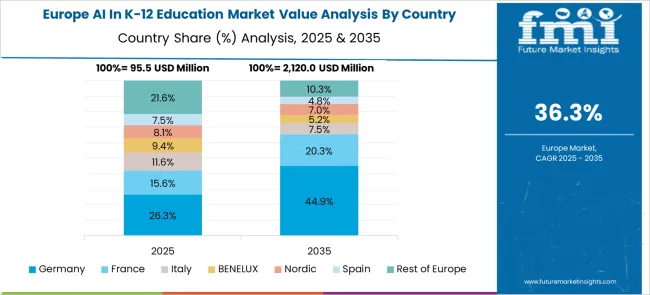
The European AI in K-12 education market is characterized by mature educational systems and comprehensive regulatory frameworks that promote responsible AI adoption while ensuring educational quality and data privacy protection across diverse learning environments. Countries across the region maintain strong educational research capabilities and advanced technology infrastructure that support evidence-based implementation of AI educational tools while addressing pedagogical effectiveness and ethical considerations. The market benefits from established educational funding mechanisms, comprehensive teacher training programs, and strong focus on educational innovation that creates steady demand for AI-powered learning solutions across public and private educational institutions.
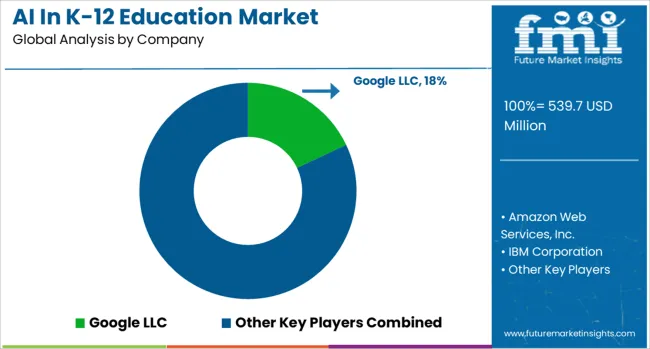
The AI in K-12 education market is defined by competition among technology giants, educational publishers, and specialized EdTech companies offering comprehensive AI-powered learning solutions for educational institutions and individual learners. Companies are investing in machine learning algorithms, natural language processing, adaptive learning technologies, and comprehensive educational content to deliver personalized learning experiences that improve student outcomes while supporting teacher effectiveness and administrative efficiency. Strategic partnerships with educational institutions, content licensing, and platform integration are central to strengthening market presence and educational impact.
Major AI educational technology companies maintain comprehensive development capabilities and extensive educational expertise that enable schools and educational institutions to implement optimal AI-powered learning solutions for diverse educational needs and student populations. Google LLC, USA-based, offers comprehensive AI educational platforms including learning management systems, content creation tools, and classroom collaboration solutions that serve global educational communities. Amazon Web Services Inc. provides advanced cloud infrastructure and AI services that support educational technology deployment and scalability.
IBM Corporation delivers sophisticated AI educational solutions with focus on natural language processing and intelligent tutoring capabilities. Pearson Plc and McGraw Hill offer comprehensive educational content and AI-powered learning platforms that combine traditional educational publishing with modern AI technologies. Cognizant, Graham Holdings Company, Nuance Communications Inc., and Houghton Mifflin Harcourt provide specialized AI educational expertise, adaptive learning technologies, and comprehensive educational support across global and regional K-12 education markets.
| Items | Values |
|---|---|
| Quantitative Units | USD 539.7 million |
| Component | Solution, Services |
| Deployment | Cloud, On-premises |
| Technology | Machine Learning, Natural Language Processing (NLP) |
| Application | Learning Platform & Virtual Facilitators, Intelligent Tutoring System (ITS), Smart Content, Fraud and Risk Management, Others |
| Regions Covered | North America, Europe, East Asia, South Asia & Pacific, Latin America, Middle East & Africa |
| Countries Covered | United States, Canada, United Kingdom, Germany, France, China, Japan, South Korea, India, Brazil, Australia and 40+ countries |
| Key Companies Profiled | Google LLC; Amazon Web Services, Inc.; IBM Corporation; Pearson Plc; Cognizant; Graham Holdings Company; McGraw Hill; Nuance Communications, Inc.; Houghton Mifflin Harcourt |
| Additional Attributes | Dollar sales by component, deployment, technology, and application, regional demand trends across North America, Europe, and Asia-Pacific, competitive landscape with established technology companies and educational publishers, adoption of machine learning and natural language processing technologies, integration with personalized learning and adaptive education systems, innovations in intelligent tutoring and automated assessment solutions, and development of comprehensive educational AI platforms and content delivery systems. |
The global AI in K-12 education market is estimated to be valued at USD 539.7 million in 2025.
The market size for the AI in K-12 education market is projected to reach USD 13,617.0 million by 2035.
The AI in K-12 education market is expected to grow at a 38.1% CAGR between 2025 and 2035.
The key product types in AI in K-12 education market are solution and services.
In terms of deployment outlook , cloud segment to command 60.0% share in the AI in K-12 education market in 2025.






Our Research Products

The "Full Research Suite" delivers actionable market intel, deep dives on markets or technologies, so clients act faster, cut risk, and unlock growth.

The Leaderboard benchmarks and ranks top vendors, classifying them as Established Leaders, Leading Challengers, or Disruptors & Challengers.

Locates where complements amplify value and substitutes erode it, forecasting net impact by horizon

We deliver granular, decision-grade intel: market sizing, 5-year forecasts, pricing, adoption, usage, revenue, and operational KPIs—plus competitor tracking, regulation, and value chains—across 60 countries broadly.

Spot the shifts before they hit your P&L. We track inflection points, adoption curves, pricing moves, and ecosystem plays to show where demand is heading, why it is changing, and what to do next across high-growth markets and disruptive tech

Real-time reads of user behavior. We track shifting priorities, perceptions of today’s and next-gen services, and provider experience, then pace how fast tech moves from trial to adoption, blending buyer, consumer, and channel inputs with social signals (#WhySwitch, #UX).

Partner with our analyst team to build a custom report designed around your business priorities. From analysing market trends to assessing competitors or crafting bespoke datasets, we tailor insights to your needs.
Supplier Intelligence
Discovery & Profiling
Capacity & Footprint
Performance & Risk
Compliance & Governance
Commercial Readiness
Who Supplies Whom
Scorecards & Shortlists
Playbooks & Docs
Category Intelligence
Definition & Scope
Demand & Use Cases
Cost Drivers
Market Structure
Supply Chain Map
Trade & Policy
Operating Norms
Deliverables
Buyer Intelligence
Account Basics
Spend & Scope
Procurement Model
Vendor Requirements
Terms & Policies
Entry Strategy
Pain Points & Triggers
Outputs
Pricing Analysis
Benchmarks
Trends
Should-Cost
Indexation
Landed Cost
Commercial Terms
Deliverables
Brand Analysis
Positioning & Value Prop
Share & Presence
Customer Evidence
Go-to-Market
Digital & Reputation
Compliance & Trust
KPIs & Gaps
Outputs
Full Research Suite comprises of:
Market outlook & trends analysis
Interviews & case studies
Strategic recommendations
Vendor profiles & capabilities analysis
5-year forecasts
8 regions and 60+ country-level data splits
Market segment data splits
12 months of continuous data updates
DELIVERED AS:
PDF EXCEL ONLINE
AI Code Assistant Market Size and Share Forecast Outlook 2025 to 2035
AI-Based Data Observability Software Market Size and Share Forecast Outlook 2025 to 2035
Air Struts Market Size and Share Forecast Outlook 2025 to 2035
AI-powered Wealth Management Solution Market Size and Share Forecast Outlook 2025 to 2035
AI Document Generator Market Size and Share Forecast Outlook 2025 to 2035
Air Caster Skids System Market Size and Share Forecast Outlook 2025 to 2035
AI Platform Market Size and Share Forecast Outlook 2025 to 2035
AI-Powered Sleep Technologies Market Size and Share Forecast Outlook 2025 to 2035
AI-Powered Gait & Mobility Analytics Market Size and Share Forecast Outlook 2025 to 2035
AI-Powered Behavioral Therapy Market Size and Share Forecast Outlook 2025 to 2035
AI-Enabled Behavioral Therapy Market Size and Share Forecast Outlook 2025 to 2035
Airflow Balancer Market Size and Share Forecast Outlook 2025 to 2035
AIOps Platform Market Forecast and Outlook 2025 to 2035
Aircraft Flight Control System Market Size and Share Forecast Outlook 2025 to 2035
Airborne Radar Market Size and Share Forecast Outlook 2025 to 2035
AI-Powered CRM Platform Market Forecast Outlook 2025 to 2035
AI Animation Tool Market Forecast Outlook 2025 to 2035
Aircraft Electric Motor Market Forecast Outlook 2025 to 2035
Airport Ground Transportation Market Forecast and Outlook 2025 to 2035
AI Image Editor Market Forecast and Outlook 2025 to 2035

Thank you!
You will receive an email from our Business Development Manager. Please be sure to check your SPAM/JUNK folder too.
Chat With
MaRIA